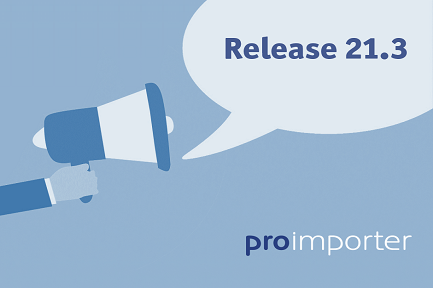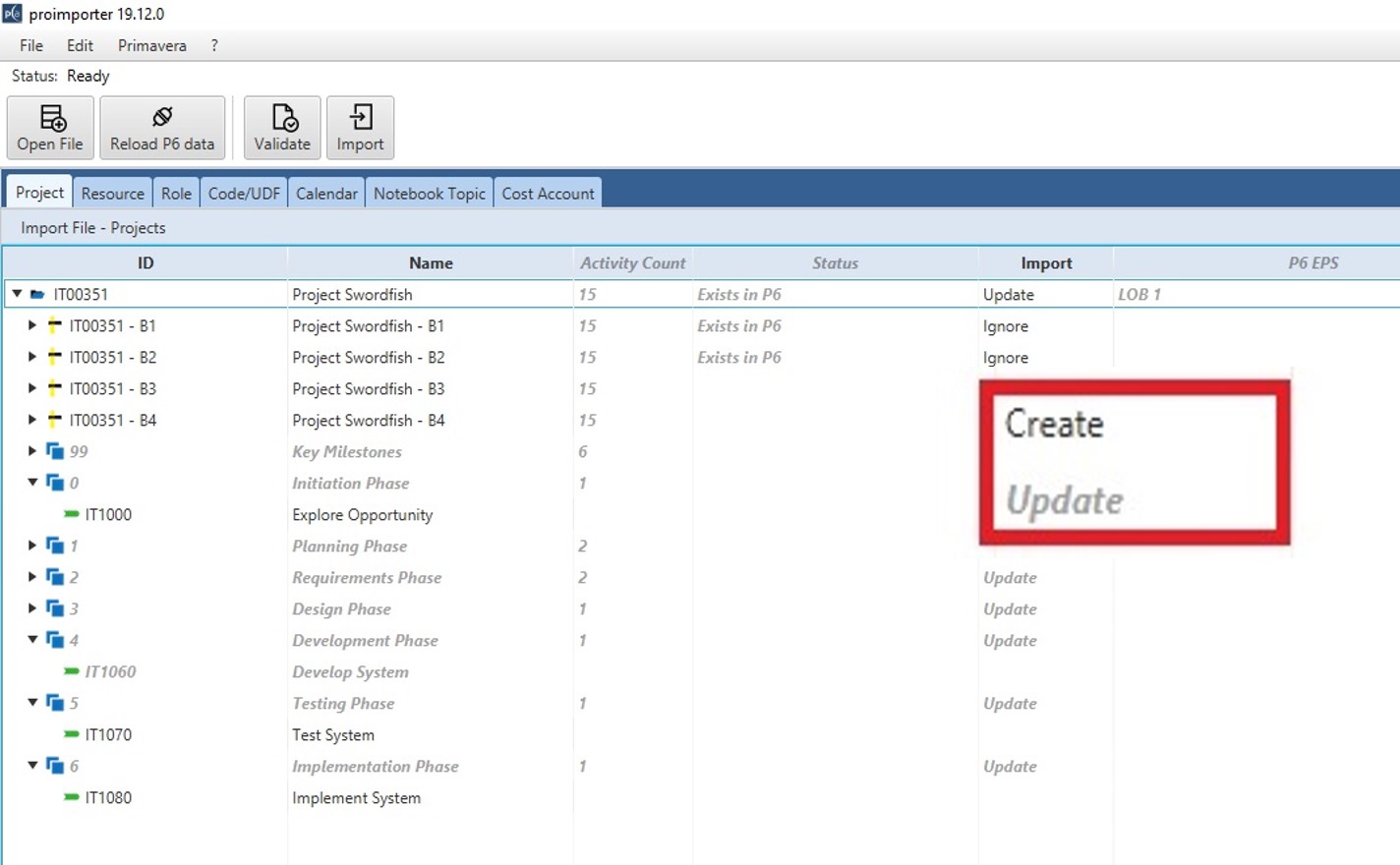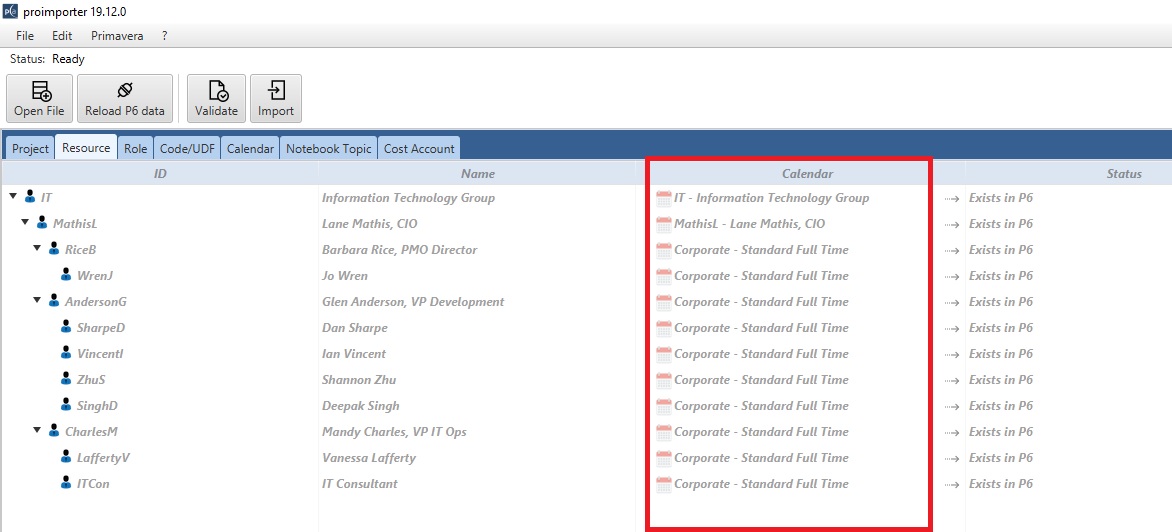
Release 21.10
Import of MS Project Resources and Cost Accounts to Oracle Primavera P6
With the new release 21.10, we enable the direct import of resources incl. resource units and resource assignments from Microsoft Project into Oracle Primavera P6. The new features are now available in proimporter Version 21.10.0

Release 21.3
The proimporter goes Cloud - Compatibility with the Oracle Primavera P6 EPPM Cloud
The future of technology is smart and lies in the Cloud – with the release 21.3, we are responding to this digital transformation by creating a direct connection of the proimporter to cloud-hosted Oracle® Primavera P6 EPPM databases.

Release 20.5
The proimporter is growing and now compatible with Oracle® Primavera P6 PPM
From release 20.5 on, our tool also works with Oracle® Primavera P6 PPM, as long as the system runs with a Microsoft SQL database or Oracle® DB.

Release 19.12
Improved usability, new features, new quickfixes and bugfixes
Besides the optical improvements in dropdown menus and the general overview up to the technical manual, with the release 19.12 we have made general improvements in many areas.
Improved visibility of dropdown cells
Until now, the visual surface of the proimporter was the same for all cells. So it could not be distinguished which cells are editable and which are not. Only in the edit mode of a single cell it was obvious that a value can be selected from a dropdown menu.
With release 19.12, all non-editable fields will be marked grey and italicized. This allows you to see at a glance in which cells values can be adjusted.

Here you can see the difference between editable and non-editable fields.
Unique ID's
By shortening ID's for roles through the implemented Quickfix function, an ID can be created that is not unique. This led in Oracle® Primavera P6 EPPM so far to the fact that these data were not transferred to Oracle® Primavera P6 EPPM, because the tool does not allow duplications in the ID's simply.
The proimporter can now recognize and validate possible Unique constraint violations with its Quickfix function. Thus you avoid possible inconsistencies and keep your Oracle® Primavera P6 EPPM database clean.
Improved import for calendars without workweek
Resources and calendars are essentially the backbone of any schedule. Oracle® Primavera P6 EPPM uses workweek calendars to create reliable forecasts as a project planning tool. If the calendar in the XER-file does not contain a workweek, the XER-file is not imported into Oracle® Primavera P6 EPPM, because in Oracle® Primavera P6 EPPM calendars cannot exist without a workweek.
In the future, the proimporter will recognize whether the calendars to be imported contain a workweek. If this is not the case, the validation results in an error message. A standard workweek is then assigned to the calendar.
Technical manual
With release 19.12 we have made some additions to the technical manual. In addition, the manual is now available in English.
Resource Panel
Until now, the calendars of individual resources were not displayed in the overview of resources. With release 19.12 this changes and the calendars of the resources are now visible.

The "Calendar" column has been added to the resource panel.
The following bugfixes are included in version 19.12:
Previously, under certain circumstances, there was an incorrect status message from the proimporter after loading data from Oracle® Primavera P6 EPPM. This behavior has been corrected.
If you have any further questions, please do not hesitate to contact us.
Do you have any suggestions? You are welcome to send us your suggestions via our contact form. You can also use our chat function. At regular intervals we also offer webcasts for our proimporter. You can find the dates for these in our webcast announcements.

Release 19.10
Update of EPS activity codes during project update
With this release you can now update Activity Codes on EPS level with a project update quickly and easily. There are also some bugfixes as well as performance & usability improvements.
With the last release we had implemented the possibility in the proimporter to assign activity codes on EPS level in the future. Thus, it is possible to import sub project plans, which are in the form of activity codes in your project plan, into Oracle® Primavera P6 EPPM without changing global data.
You will certainly also receive regular updates of the sub projects of your project consortium. When importing various EPS codes, however, it quickly becomes complex. You can either import the entire file into Oracle® Primavera P6 EPPM and thus overwrite EPS activity codes and other objects, or you can prepare the file to be imported manually for the database in advance. The latter, however, also requires extraordinary knowledge about the structure of a XER file.
The proimporter enables a simple way to import EPS activity codes safely into your Oracle® Primavera P6 EPPM database. The tool examines already existing EPS activity codes and sets the import properties correctly - without reusing or without changing existing codes. All these default import actions can be further adjusted by the users. This makes it possible to quickly and easily perform a customized XER import in just a few minutes.
Enhancement of validation
Two further validation processes were added:
Older Oracle® Primavera P6 EPPM versions partially assign a data date that is before the project start. This is no longer permitted in current Oracle® Primavera P6 EPPM versions. A quickfix for this logic error is also offered.
Under certain circumstances, the What-If flags of the WBS nodes may not have been correctly exported to an XER file. The validation examines all WBS nodes and also offers a quickfix for this logic error.
Performance and Usability Improvements
In addition to the improvement of the installation routine to simplify user rights management in server operation, the user manual and the installation instructions have been revised.
The following bugfixes are included in version 19.10:
- Lookup of baselines doesn't perform the same every time
- Project Update freezes with certain input files
- Validation-Step: WBSUniqueValidationStep performance issue
- What-if status can only be applied or removed at the project level
- EPS Import Action Code Type 'to Project scope' → Code Values set to 'ignore' are still imported when EPS scoped tape already exists.
If you have any further questions, please do not hesitate to contact us.
Do you have any suggestions? You are welcome to send us your suggestions via our contact form. You can also use our chat function.
At regular intervals we also offer webcasts for our proimporter. You can find the dates for these in our webcast announcements.

